Russia-Ukraine war: bloodiest battle ends as Ukrainian fighters evacuated from Mariupol steel plant – live
Ukrainian soldiers evacuated from Mariupol steelworks
More than 260 Ukrainian soldiers, many of them wounded, have been evacuated from the besieged Azovstal steel plant in the port city of Mariupol, appearing to cede control of the city to Russia after 82 days of bombardment.
Ukraine’s deputy defence minister, Hanna Maliar, said late on Monday that 53 heavily wounded soldiers were evacuated to a hospital in the Russian-controlled town of Novoazovsk and that more than 200 others were transported through a corridor to Olenivka. An “exchange procedure will take place” to bring evacuees home, she said.
It was unclear how many soldiers remained in the steel plant, but Ukraine’s president, Volodymyr Zelenskiy, said: “We hope to save the lives of our boys”.
“I want to underline: Ukraine needs its Ukrainian heroes alive. This is our principle,” he said in a video statement.
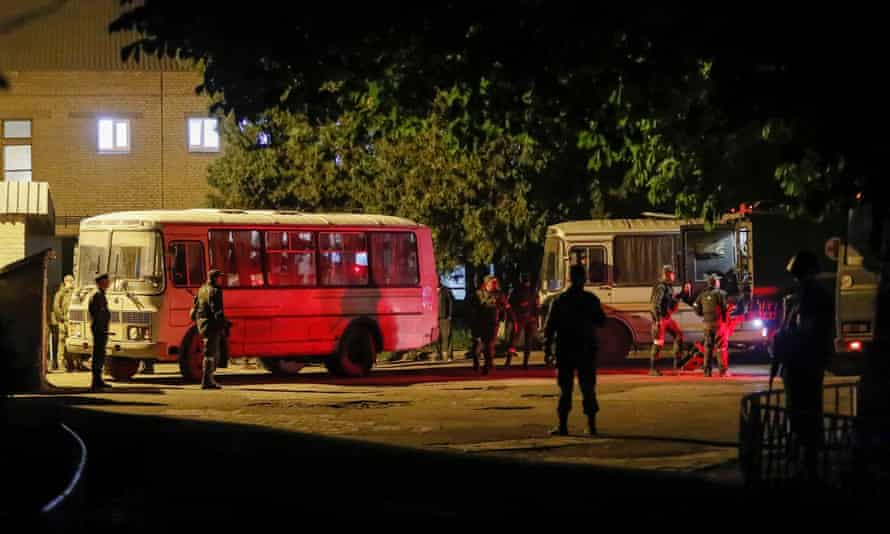
The evacuation is likely to mark the end of the longest and bloodiest battle of the Ukraine war and a significant defeat for Ukraine. Mariupol is now in ruins after a Russian siege that Ukraine says killed tens of thousands of people in the city.
For Ukrainians, the Azovstal plant has become a symbol of resistance, with hundreds of troops continuing to fight on there even after the rest of the city had fallen to Russian forces.
Six hundred troops were believed to have been inside the steel plant.
The general staff of Ukraine’s armed forces said that the soldiers defending the steel plant had fulfilled their combat mission.
“The supreme military command ordered the commanders of the units stationed at Azovstal to save the lives of the personnel,” the general staff said in a statement on its Facebook account. “Efforts to rescue defenders who remain on the territory of Azovstal continue.”
Read on here:
Dmytro Zhyvytskyi, the governor of Sumy in the north-east of Ukraine, has posted to Telegram that Okhtyrka was struck by Russian missiles overnight. He said:
Five Russian missiles landed on civilian targets and caused a lot of damage.
Warehouses caught fire. The shock wave damaged the front door of the two-story building, and people were trapped inside.
Many private houses were affected. The windows in the church were broken. The “Fairy Tale” Kindergarten also suffered. This is the same one that was bombed by the racists in the first days of the war, when people died here.
At least five people have been injured in today’s attack on the city.
The claims have not been independently verified. Russia has repeatedly insisted its attacks only target the military and military infrastructure.
Jailed Kremlin critic Alexei Navalny is due to appeal against a nine-year prison sentence he was handed in March on charges that he and his allies say are politically motivated, AFP reports.
The news agency writes:
His hearing on Tuesday comes as Russian authorities seek to silence remaining government critics and Moscow pushes on with its military campaign in neighbouring Ukraine, with thousands killed and 10 million displaced.
A vocal critic of Russian president Vladimir Putin, Navalny in late March had his jail time extended to nine years after he was found guilty of embezzlement and contempt of court.
He is already serving two-and-a-half years in a prison 100 kilometres east of Moscow for violating parole on old fraud charges.
On Tuesday, he will appeal against the extension of his jail term, joining the hearing at a Moscow court via video link from his prison colony.
If his new sentence comes into force, the 45-year-old opposition politician will be transferred to a strict-regime penal colony, which will place him in much harsher conditions.
The new sentence will replace the old one – that he was handed in February last year – meaning Navalny will remain behind bars for another eight years.
As part of the new charges, investigators accused Navalny of stealing for personal use several million dollars’ worth of donations that were given to his political organisations.
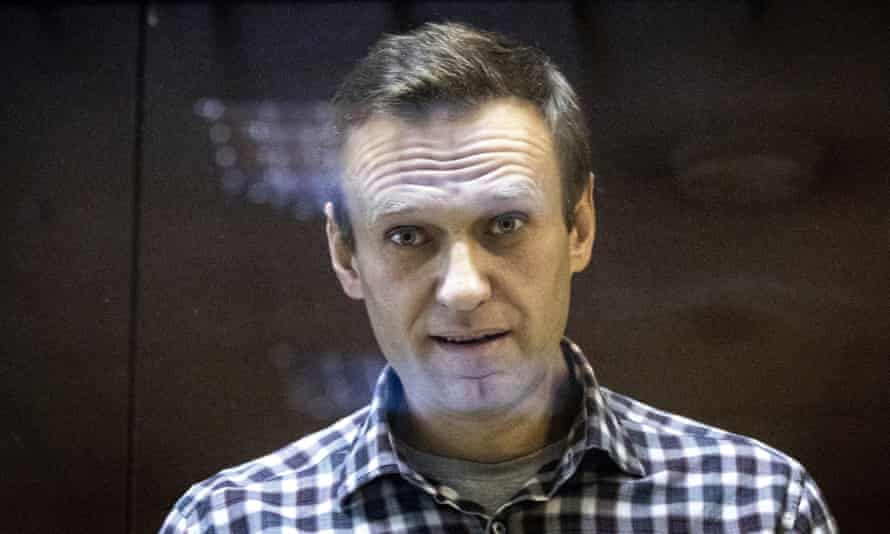
The evacuation of Ukrainian fighters from Mariupol’s Azovstal steel plant, their last remaining redoubt in the city, began on Monday. Here are some images from that evacuation:
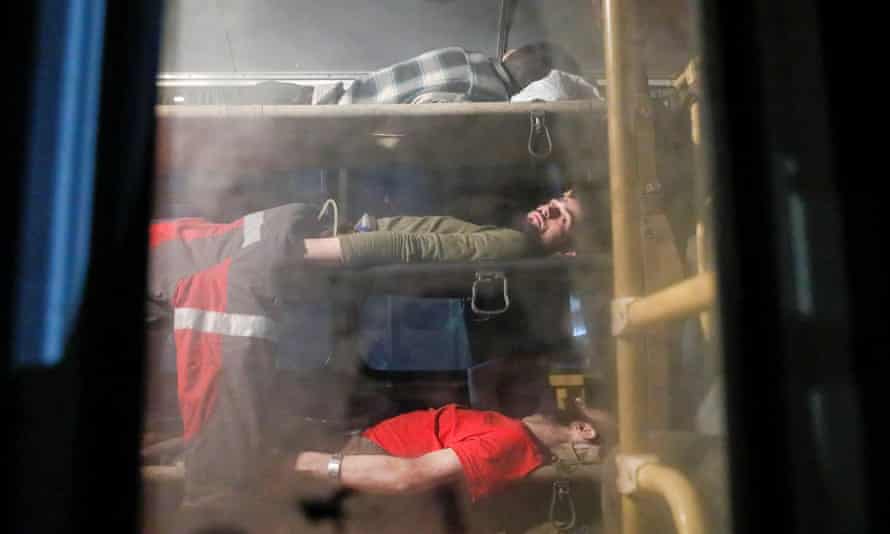
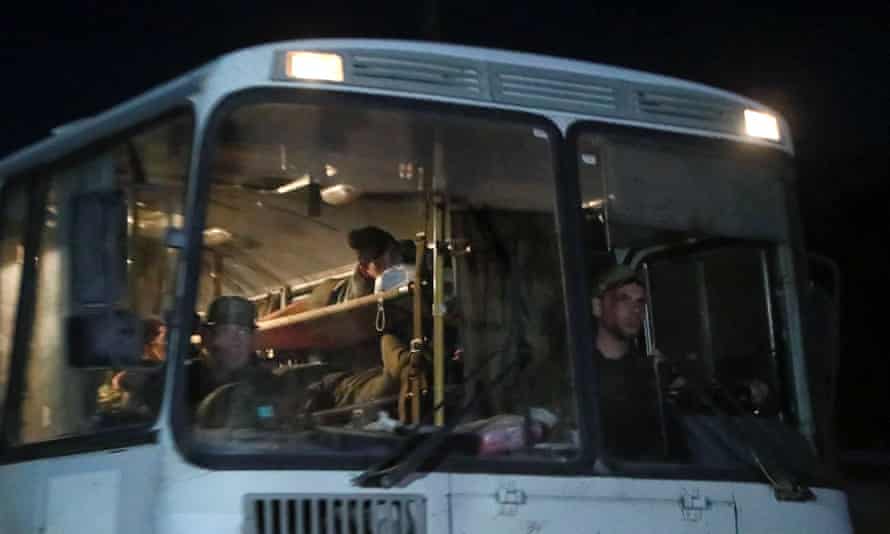
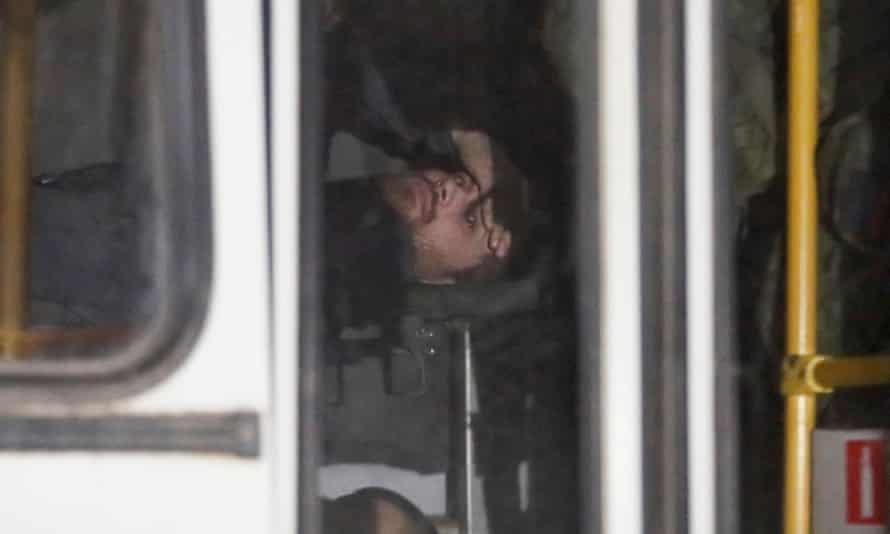
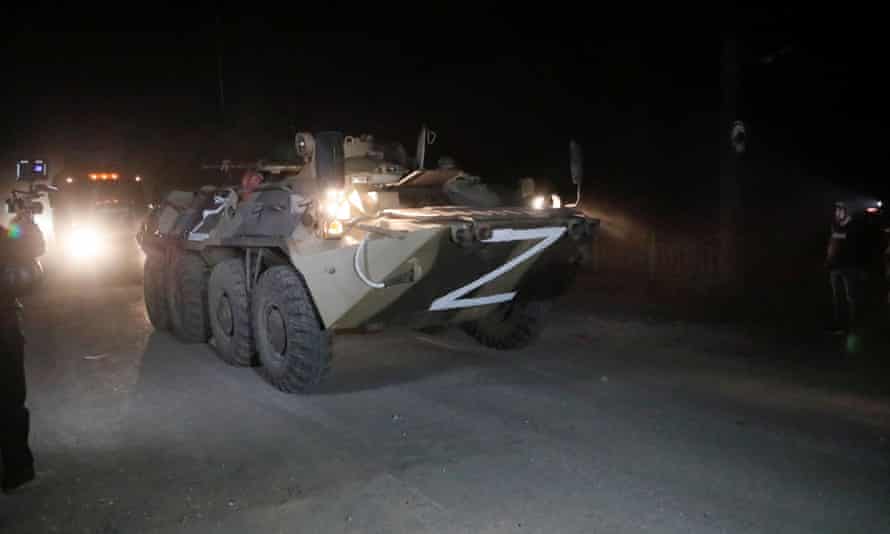
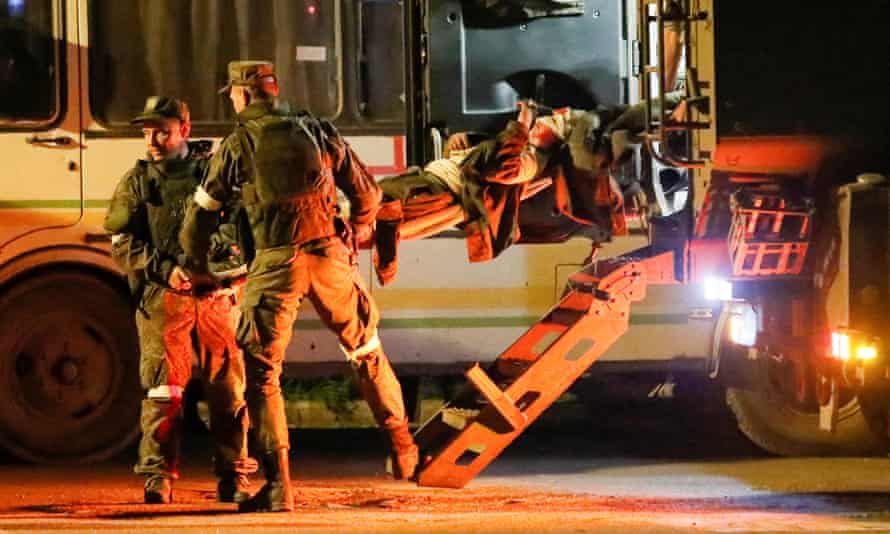
A village in Russia’s western province of Kursk bordering Ukraine came under Ukrainian fire on Tuesday, regional governor Roman Starovoit said, according to Reuters, but there were no injuries, although three houses and a school were hit.
Russian border guards returned fire to quell the shooting from large-calibre weapons on the border village of Alekseyevka, Starovoit wrote on the messaging app Telegram.

Andrew Roth
More on the theme of Russian disenchantment with the war from the Guardian’s own Moscow correspondents Andrew Roth and Pjotr Sauer.
They report that as more and more information has leaked out about the scale of Russia’s losses in Ukraine, it has angered the families of soldiers and discouraged even previous supporters of the invasion.
Here’s an extract from their report:
“I look at my government totally different since the war started,” said Tatyana Efremenko, 39, whose son Nikita Efremenko was a conscript on the Moskva missile cruiser when it was sunk in a Ukrainian missile strike one month ago. She is still searching for her son. “There are some very harsh things I would like to say about our leadership, but maybe best if I don’t because they would put me in prison for it.”
In Russian-controlled east Ukraine, wives of fighters have complained on camera that their husbands were left behind as Russian soldiers retreated across the border near Kharkiv. “They aren’t deserters, just those who managed to get away with their lives,” one woman yelled at a local official.
Kyiv has said that it has the remains of thousands of Russian soldiers, but Moscow won’t accept them because that would force it to admit the high death toll in the war.
As evidence of the Bilohorivka rout became clear over the last week, even some pro-Russian cheerleaders appeared to be losing faith in the wisdom of the country’s military leadership.
“Until we know the name of the ‘military genius’ who put a battalion tactical group by the river and he doesn’t answer for it publicly, then there will never be reforms in the army,” wrote Vladlen Tatarzky, the pseudonym used by a Russian blogger and former soldier who has more than 300,000 subscribers on Telegram.
He has generally supported the war. “How can one not remember comrade Stalin here, who despite the difficult military situation was not afraid to take difficult personnel decisions? If this isn’t done, then no mobilisation will save us.”
Read on here:
The scale of the damage left behind by Russian troops north of Kyiv illustrates Russian willingness to use artillery on inhabited areas, the UK’s Ministry of Defence has said in its latest intelligence update, adding that Moscow is likely to rely more on artillery in the Donbas in coming weeks.
In the Chernihiv region north of Kyiv, approximately 3,500 buildings are estimated to have been destroyed or damaged during Russia’s abandoned advance towards the Ukrainian capital. 80% of the damage has been caused to residential buildings.
The scale of this damage indicates Russia’s preparedness to use artillery against inhabited areas, with minimal regard to discrimination or proportionality.
Russia has likely resorted to an increasing reliance on indiscriminate artillery bombardment due to a limited target acquisition capability, and an unwillingness to risk flying combat aircraft routinely beyond its own frontlines.
In the coming weeks, Russia is likely to continue to rely heavily on massed artillery strikes as it attempts to regain momentum in its advance in the Donbas.
Russia is conducting its main combat efforts in the Donetsk region, Ukraine’s general staff has said in its 6am update, claiming that Ukrainian forces had repulsed 11 attacks in Donetsk and Luhansk over the past 24 hours, destroying equipment including five tanks, one Tor anti-aircraft missile system, six artillery systems, and 12 armoured combat vehicles.
It also said Russian aircraft had “destroyed civilian and military infrastructure in the Eastern Operational Zone and industrial facilities deep in Ukraine” without giving any more details.
In Kharkiv, where Ukrainian forces have reportedly driven back Russian forces to the Russian border, the “enemy’s main efforts are focused on maintaining their positions and preventing the advance of our troops.”
The general staff also said it was compiling a separate report on the “total losses of the enemy” which would be published soon.
It has been very difficult to verify the scale of Russian losses in the war.
Moscow last released casualty data in late March, admitting that 1,351 Russian soldiers had been killed and 3,825 wounded in the first month of the war. The government has not released any more information on casualties in the last month and a half, except to say that they were “significant”.
Western estimates have been 10 or even 20 times as high, with some suggesting that Russia has lost more than 30,000 soldiers since the beginning of the war.
❗️Оперативна інформація станом на 06.00 17.05.2022 щодо російського вторгнення
Розпочалась вісімдесят третя доба героїчного протистояння Української нації російському воєнному вторгненню.
Більше тут ➡️ https://t.co/Krkfm3ZXDc pic.twitter.com/WdgLtsO6gg
— Defence of Ukraine (@DefenceU) May 17, 2022
A surprisingly candid assessment from a Russian analyst on Russia’s invasion of Ukraine, with subtitles provided by the BBC’s Francis Scarr – fascinating viewing if you have five minutes to watch it.
Mikhail Khodaryonok argues that Russian reports of demoralisation among Ukrainian troops are just individual cases and not indicative of a general mood. In fact, he says, Ukrainians are highly motivated and ready to die for their country, which he says is a “component of an army’s high combat readiness, one of the most important components.”
He also warns against “sabre-rattling with missiles in Finland’s direction … after all the main deficiency of our military-political position is that, in a way, we are in full geopolitical isolation and that, however much we would hate to admit this, virtually the entire world is against us.”
In an extremely rare moment of candour on Russian state TV today, defence columnist Mikhail Khodaryonok gave a damning assessment of Russia’s war in Ukraine and his country’s international isolation. It’s fairly long but worth your time so I’ve added subtitles. pic.twitter.com/0mr7WAgSx6
— Francis Scarr (@francis_scarr) May 16, 2022
Many are wondering: why is Khodaryonok allowed to keep talking on Russian TV where any dissent is discouraged? Because his words don’t harm the regime. To the contrary, they help temper the expectations, while other pundits promise fast, easy victories.https://t.co/ynLM15FwqE
— Julia Davis (@JuliaDavisNews) May 17, 2022
A bit more from the ISW assessment, which says there is growing friction between Russian occupation administrations and pro-Russian collaborators in occupied areas of Ukraine, while inside Russia military bloggers are increasingly in-line with western assessments of Russian military failures.
Russian forces in Zaporizhia, are having “serious conflicts” with collaborators due to “interpersonal power conflicts,” in the Zaporizhia region, the US-based think tank cites the region’s military administrations as saying.
A well-known collaborator in Zaporizhia accused the Russian-installed governor of the area of stealing his 10,000 ruble compensation. Advisor to the Mayor of Mariupol Petro Andryshchenko additionally claimed that relatives of those mobilized into the forces of the Donetsk People’s Republic (DNR) are holding a mass protest against mobilization in Donetsk City.
While ISW cannot independently verify these claims, such discontent amongst occupation elements suggests a general lack of planning by Russian authorities in occupied areas, now compounded by increasingly evident Russian losses.
The ISW meanwhile predicted that the “continued disenchantment of pro-Russian milbloggers with the Russian war effort may fuel dissatisfaction in Russia itself, especially if Moscow continues to press recruitment and conscription efforts that send poorly-trained cannon-fodder to the front lines.”
One such blogger, Igor Strelkov, claimed that the Russian offensive to take Donbas has ultimately failed and that “not a single large settlement “has been liberated.
Strelkov even noted that the capture of Rubizhne [a city in Luhansk] is relatively insignificant because it happened before the new offensive in Donbas had begun.
Strelkov stated that Russian forces are unlikely to liberate Donbas by the summer and that Ukrainian troops will hold their positions around Donetsk City.
Strelkov notably claimed that Russian failures thus far have not surprised him because the intent of Russian command has been so evident throughout the operation that Ukrainian troops are aware of exactly how to best respond and warns that Russian troops are fighting to the point of exhaustion under “rules proposed by the enemy.”
The Russian withdrawal from around Kharkiv is different from previous Russian withdrawals from around Kyiv and other cities, when they pulled back to Russian territory, in that they are trying to retain a position in Ukraine, the Institute for the Study of War think tank writes in its latest assessment of the conflict.
The Russian grouping around Kharkiv City is notably trying to hold the border and prevent Ukrainian troops from advancing further north.
Russian troops may seek to retain positions in Ukraine and continue artillery strikes on Ukrainian positions in order to prevent Ukrainian forces from getting into tube or rocket-artillery range of the outskirts of Belgorod, a major city in Russia and a key hub of the Russian military effort.
The Russians might alternatively hope to conduct a counter-counter-offensive to push back south toward Kharkiv, although such an effort is highly unlikely to succeed.
Ukrainian soldiers evacuated from Mariupol steelworks
More than 260 Ukrainian soldiers, many of them wounded, have been evacuated from the besieged Azovstal steel plant in the port city of Mariupol, appearing to cede control of the city to Russia after 82 days of bombardment.
Ukraine’s deputy defence minister, Hanna Maliar, said late on Monday that 53 heavily wounded soldiers were evacuated to a hospital in the Russian-controlled town of Novoazovsk and that more than 200 others were transported through a corridor to Olenivka. An “exchange procedure will take place” to bring evacuees home, she said.
It was unclear how many soldiers remained in the steel plant, but Ukraine’s president, Volodymyr Zelenskiy, said: “We hope to save the lives of our boys”.
“I want to underline: Ukraine needs its Ukrainian heroes alive. This is our principle,” he said in a video statement.

The evacuation is likely to mark the end of the longest and bloodiest battle of the Ukraine war and a significant defeat for Ukraine. Mariupol is now in ruins after a Russian siege that Ukraine says killed tens of thousands of people in the city.
For Ukrainians, the Azovstal plant has become a symbol of resistance, with hundreds of troops continuing to fight on there even after the rest of the city had fallen to Russian forces.
Six hundred troops were believed to have been inside the steel plant.
The general staff of Ukraine’s armed forces said that the soldiers defending the steel plant had fulfilled their combat mission.
“The supreme military command ordered the commanders of the units stationed at Azovstal to save the lives of the personnel,” the general staff said in a statement on its Facebook account. “Efforts to rescue defenders who remain on the territory of Azovstal continue.”
Read on here:
Welcome summary
Hello, this is Helen Livingstone, bringing you the latest developments on the war in Ukraine. Here’s a recap of the latest:
- The evacuation of wounded Ukrainian troops from the Azovstal steelworks in Mariupol is under way, president Volodomyr Zelenskiy confirmed, with more than 260 fighters transported out of the plant. The troops have fulfilled their combat mission, the general staff of the armed forces said. Ukraine’s deputy defense minister has said an “exchange procedure will take place” to bring evacuees home.
- Ukraine’s Joint Forces Task Force said on Monday that 20 civilians, including a child, were killed in Russian shelling in the Donetsk and Luhansk regions.
- Western military sources say that Vladimir Putin is involved in the war in Ukraine “at the level of a colonel or brigadier”. The Russian leader is reportedly so personally involved he is helping determine the movement of forces in the Donbas.
- Ukrainian officials claimed that troops counter-attacking against Russian forces in the country’s north-east had pushed them back from the city of Kharkiv and advanced as far as the border with Russia.
- Russian forces have shelled frontline positions in Ukraine’s eastern Donbas area as fighting becomes increasingly focused on Severodonetsk, the easternmost city still held by Ukrainian forces after more than 11 weeks of war.
- After Sweden and Finland yesterday confirmed plans to join Nato, Sweden is seeking to quell Turkish opposition by sending diplomats to the country. Turkish president Recep Tayyip Erdoğan has said Turkey will not approve the bids, and that delegations from the countries should not bother coming.
- Vladimir Putin said Russia had “no problems” with Finland and Sweden. “And so in this sense there is no immediate threat to Russia from an expansion to include these countries,” Putin said. The comments appeared to mark a major shift in rhetoric, after years of casting Nato enlargement as a direct threat to Russia’s security. However he did say that the expansion of military infrastructure on their territory would demand a reaction from Moscow.
- Hungary has been accused of “holding the EU hostage” over its refusal to agree an oil embargo against Russia, as the bloc struggles to reach consensus on its latest sanctions aimed at eroding the Kremlin’s ability to wage war.
- American fast-food giant McDonald’s will exit the Russian market and sell its business in the increasingly isolated country, the company said on Monday. Meanwhile, the Moscow city government is to take over a factory belonging to the French carmaker Renault and use it to revive the Soviet-era Moskvitch in Russia’s first major nationalization of a foreign company during its war in Ukraine.
[ad_2]
Share this news on your Fb,Twitter and Whatsapp
Times News Network:Latest News Headlines
Times News Network||Health||New York||USA News||Technology||World News